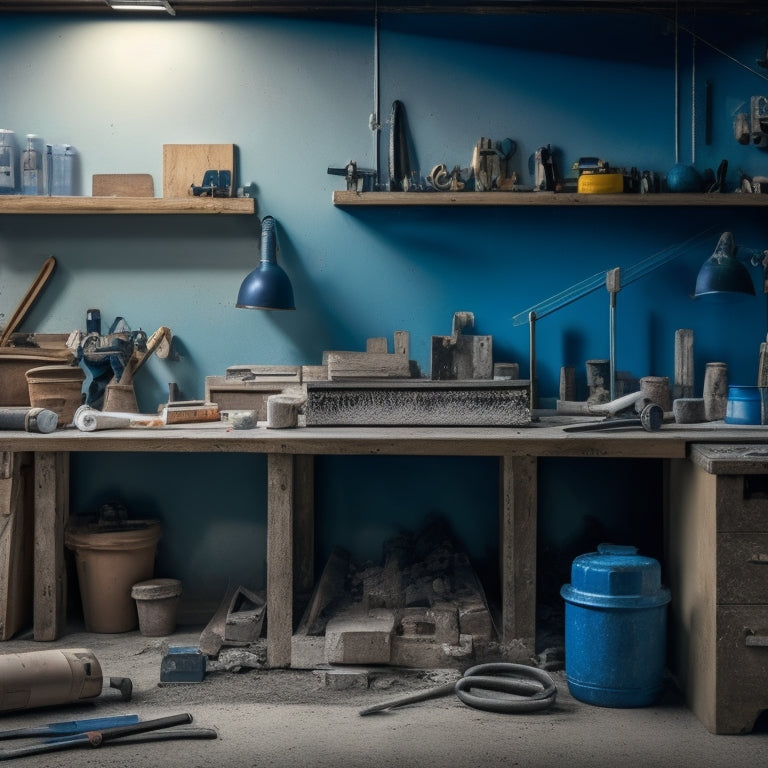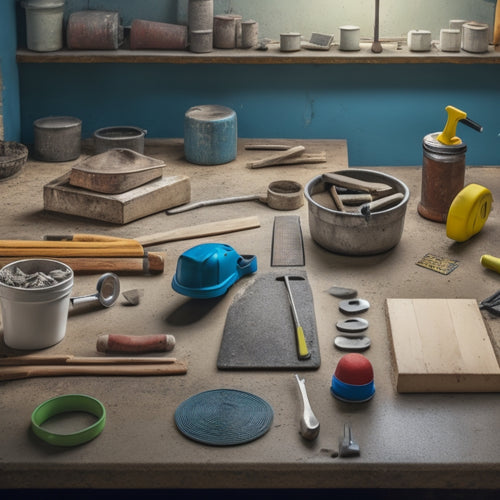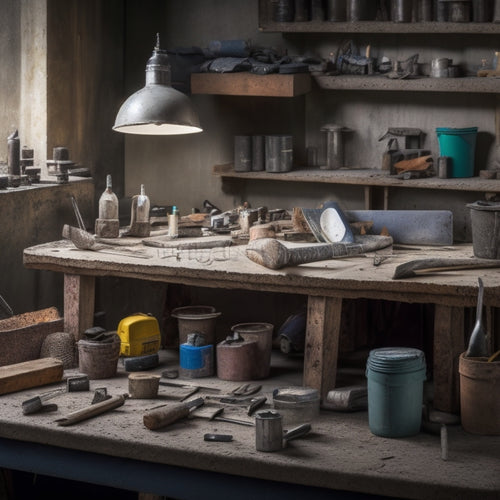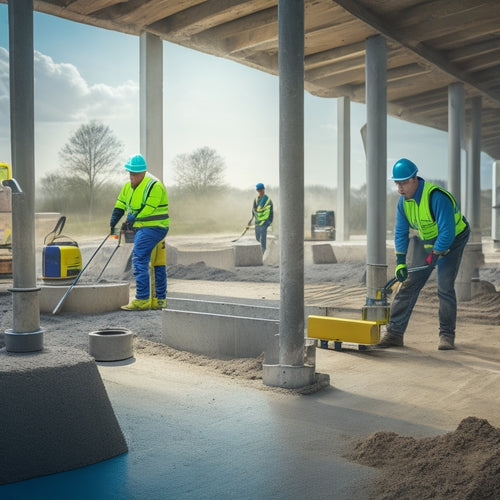
Top 10 Must-Have Tools for Concrete Block Protection
Share
To guarantee effective concrete block protection, you'll need a robust toolkit with the right equipment. Start with essential cleaning solutions, a pressure washer for heavy-duty tasks, and stiff or soft-bristle cleaning brushes for different surfaces. A mild detergent and water mix is a cost-effective cleaning solution, while a sealing applicator roller system streamlines the sealing process. You'll also need high-pressure nozzle accessories, concrete surface preparation tools, protective gloves and safety gear, and measuring cups and spray bottles for accurate application. With these must-have tools, you'll be well-equipped to protect your concrete blocks - and now you can take the next step in mastering their maintenance.
Key Takeaways
• Essential cleaning solutions, pressure washers, and brushes are must-haves for removing dirt and grime from concrete blocks.
• A sealing applicator roller system and high-pressure nozzle accessories are crucial for efficient and effective application of protective coatings.
• Concrete surface preparation tools, such as wire brushes and surface leveling tools, ensure a smooth and even surface for coating application.
• Protective gloves and safety gear, like safety glasses and face shields, are vital for personal safety when working with harsh chemicals and abrasive materials.
• Accurate measuring cups and spray bottles are necessary for precise mixing and application of cleaning solutions and protective coatings.
Essential Cleaning Solution Supplies
You'll need a reliable cleaning solution to remove dirt, grime, and other substances that can compromise the integrity of your concrete blocks. Having the right supplies on hand is essential to achieving effective cleaning results.
To guarantee you're well-equipped, stock up on eco-friendly cleaners that are specifically designed for concrete surfaces. These gentle yet effective formulas won't damage your blocks or the environment. Additionally, invest in surface stain removers that can tackle tough stains and discoloration. Look for products that are pH-neutral and biodegradable to guarantee a safe and sustainable cleaning process.
When selecting your cleaning solutions, make sure to read labels carefully and choose products that are free from harsh chemicals and toxins. Avoid using acidic or abrasive cleaners, as they can etch or scratch your concrete blocks. Instead, opt for gentle, non-abrasive formulas that won't compromise the surface.
Pressure Washer for Heavy Duty
For tougher cleaning tasks that require more force, a pressure washer becomes a necessary tool in your concrete block protection arsenal.
You'll need to choose from various pressure washer types, including electric, gas-powered, and diesel-powered models, each suited for specific tasks and environments. When selecting a pressure washer, consider the power output, water flow rate, and nozzle type to guarantee you get the right one for your concrete block protection needs.
To guarantee peak performance and extend the lifespan of your pressure washer, regular maintenance is essential.
Here are some important tips:
-
Regularly check and clean the nozzle and wand to prevent clogging and maintain consistent pressure.
-
Change the oil and air filters regularly to prevent engine damage and maintain peak performance.
-
Store the pressure washer in a dry, protected area to prevent rust and corrosion.
Stiff Bristle Cleaning Brushes
When it comes to protecting your concrete blocks, you'll need a stiff bristle cleaning brush that can effectively remove debris without damaging the surface.
You'll want to choose a brush with bristles that are strong enough to withstand the rigors of cleaning, yet gentle enough to avoid scratching the concrete.
Bristle Strength Matters
Stiff bristle cleaning brushes, boasting enhanced bristle strength, effectively dislodge stubborn dirt and debris from concrete block surfaces.
As you select the right brush for your concrete block protection needs, you'll want to prioritize bristle durability and cleaning efficiency. A brush with sturdy bristles can withstand the rigors of frequent use and maintain its effectiveness over time.
Here are some key benefits of stiff bristle cleaning brushes with enhanced bristle strength:
-
Improved cleaning power: Stiffer bristles can reach deeper into crevices and corners, lifting dirt and debris with ease.
-
Reduced wear and tear: Durable bristles resist breakage and wear, reducing the need for frequent brush replacements.
-
Enhanced cleaning efficiency: With stiffer bristles, you can cover more surface area in less time, streamlining your cleaning process.
Effective Debris Removal
By leveraging the enhanced bristle strength of stiff bristle cleaning brushes, you can effectively remove stubborn debris from concrete block surfaces, ensuring a thorough clean that prevents damage and prolongs the lifespan of your blocks.
When it comes to debris removal, stiff bristle cleaning brushes stand out from the competition due to their exceptional ability to penetrate crevices and corners, making them ideal for surface restoration techniques.
As you tackle debris collection methods, stiff bristle cleaning brushes prove to be a valuable asset. They effortlessly sweep away dirt, grime, and other obstructions, revealing a clean and even surface.
This level of precision is particularly important when working with concrete blocks, as any remaining debris can compromise the structural integrity of the material.
Mild Detergent and Water Mix
When it comes to protecting your concrete blocks, you'll want to create an effective cleaning solution using a mild detergent and water mix.
You'll need to get the dilution ratio just right to avoid damaging the blocks or leaving residue behind.
Effective Cleaning Solution
You can create an effective cleaning solution for concrete block protection by mixing a mild detergent with water in a 1:10 ratio. This solution is gentle on the surface yet tough on dirt and grime.
When selecting a mild detergent, opt for eco-friendly options that are free from harsh chemicals, ensuring surface compatibility and minimizing environmental impact.
Here are some benefits of using a mild detergent and water mix:
-
It's a cost-effective solution, reducing the need for specialized cleaning products.
-
It's easy to prepare, and the ratio can be adjusted according to your specific cleaning needs.
-
It's a versatile solution that can be used for various types of concrete block surfaces, from smooth to textured.
Proper Dilution Ratio
To achieve the best cleaning performance, mix the mild detergent with water at a precise 1:10 ratio, guaranteeing the solution effectively lifts dirt and grime without damaging the concrete block surface.
This ratio is vital, as an inaccurate dilution measurement can compromise the cleaning solution's effectiveness or even damage the concrete.
When measuring the ratio, accuracy is key. You'll want to guarantee you're using the correct proportion of detergent to water.
A 1:10 ratio means one part detergent to ten parts water. To get it right, use a measuring cup or a digital scale to guarantee precision.
Avoid estimating or eyeballing the measurement, as this can lead to an ineffective or even harmful cleaning solution.
Soft Bristle Brush for Delicate
Concrete block surfaces requiring delicate cleaning, such as those with intricate carvings or textured finishes, benefit from the gentle touch of a soft bristle brush. When you're working with surfaces that demand extra care, a soft bristle brush is an essential tool to have in your arsenal.
The soft bristle benefits are twofold: they effectively remove dirt and debris without scratching the surface, and they won't damage the concrete block's texture or finish.
Here are some key advantages of using a soft bristle brush for delicate surface care:
-
Gentle yet effective cleaning: Soft bristle brushes are perfect for cleaning concrete block surfaces with intricate carvings or textured finishes, as they won't scratch or damage the surface.
-
Preserves surface texture: The soft bristles won't wear away the concrete block's texture or finish, ensuring it remains intact and preserved.
-
Easy to use: Soft bristle brushes are simple to use and require minimal effort, making them an excellent addition to your concrete block protection toolkit.
Sealing Applicator Roller System
By streamlining the sealing process, a high-quality sealing applicator roller system efficiently applies protective coatings to large concrete block surfaces with unparalleled speed and consistency.
You'll benefit from the system's ability to cover vast areas quickly and uniformly, making it an essential tool for large-scale concrete block protection projects.
When selecting a sealing applicator roller system, look for one that incorporates advanced sealing techniques, such as adjustable pressure control and precision flow rates. This will guarantee a flawless finish and minimize waste.
Additionally, consider the importance of roller maintenance to extend the system's lifespan. Regularly clean and inspect the rollers to prevent clogging and damage.
A well-maintained sealing applicator roller system will provide consistent results and reduce downtime. By investing in a high-quality system and following proper maintenance procedures, you'll be able to protect your concrete blocks with confidence and precision.
With this tool in your arsenal, you'll be able to tackle even the most demanding projects with ease.
High-Pressure Nozzle Accessories
When it comes to high-pressure nozzle accessories, you'll need to evaluate the right nozzle tip for your concrete block protection task.
You'll want to select a tip that provides the ideal spray pattern and pressure to effectively apply your sealant or coating.
Nozzle Tip Selection Guide
You'll need to select the right nozzle tip to guarantee effective cleaning and protection of concrete blocks, as the wrong choice can lead to reduced performance and even damage to the surface.
With various nozzle types available, it's crucial to take into account factors such as pressure, flow rate, and orifice size to make sure you're getting the best results.
Here are a few key considerations to keep in mind when selecting a nozzle tip:
-
Nozzle orifice size: A smaller orifice size is ideal for precision cleaning, while a larger size is better suited for high-flow applications.
-
Nozzle material: Choose a nozzle tip made from a durable material, such as stainless steel or ceramic, to withstand the demands of high-pressure cleaning.
-
Nozzle maintenance: Regularly inspect and clean your nozzle tip to prevent clogging and maintain peak performance.
Spray Pattern Control
Spray Pattern Control
Having selected the right nozzle tip, you can further refine your high-pressure cleaning setup with spray pattern control accessories that help direct and focus the powerful water jet onto the concrete block surface. These accessories allow for precise nozzle adjustment, ensuring the spray pattern is tailored to your specific cleaning needs.
| Accessory | Function |
|---|---|
| Deflector Nozzles | Alter spray angle and width for precise cleaning |
| Rotary Nozzles | Create a rotating spray pattern for efficient cleaning |
| Fan Tip Nozzles | Disperse water jet into a wide, flat fan shape |
| Extension Wands | Increase reach and control for hard-to-access areas |
| Spray Tips | Fine-tune spray pattern and pressure for delicate surfaces |
Concrete Surface Preparation Tools
Before applying any protective coatings or treatments, clean and prepare the concrete surface using specialized tools, such as wire brushes, scrubbers, and degreasers, to remove dirt, grime, and old coatings that can compromise adhesion.
This vital step guarantees a strong bond between the concrete and the protective layer, assuring ideal performance and longevity.
To achieve a smooth, even surface, you'll need the right tools for the job. Here are some essentials to take into account:
-
Wire brushes: For aggressive cleaning and surface preparation, wire brushes are ideal for removing heavy dirt and grime buildup.
-
Surface leveling tools: These tools help you achieve a uniform, level surface, assuring a consistent application of protective coatings and treatments.
-
Moisture barrier applicators: These tools allow you to efficiently apply moisture barrier coatings, preventing water infiltration and subsequent damage to the concrete.
Protective Gloves and Safety Gear
When handling concrete block protection products, wear protective gloves and safety gear to shield yourself from harsh chemicals, abrasive materials, and physical hazards. You don't want to risk skin irritation, cuts, or other injuries that can compromise your work and well-being.
Choose gloves made from high-quality materials like nitrile, latex, or PVC, which provide excellent resistance to chemicals and abrasion. Make certain the gloves fit comfortably, allowing for dexterity and flexibility.
In addition to gloves, adhere to safety regulations by wearing safety glasses, face shields, and respiratory protection when necessary. Safety regulations, such as OSHA guidelines, dictate the minimum requirements for personal protective equipment (PPE) in various industries.
Familiarize yourself with these regulations to guarantee compliance and peak protection.
Measuring Cups and Spray Bottles
Accurate measurements are essential in concrete block protection, and using high-quality measuring cups guarantees the correct proportions of products are mixed and applied.
You can't afford to get it wrong, as this can lead to compromised protection and structural integrity. When it comes to measuring techniques, you'll want to invest in cups that are easy to read, durable, and resistant to corrosion.
Here are some key considerations for measuring cups and spray bottles:
-
Choose cups with clear markings: Confirm the measurements are easy to read, even in low-light conditions.
-
Select spray bottles with adjustable nozzles: This allows you to control the spray pattern and flow rate for maximum application.
-
Consider spray bottle types: From HVLP (high-volume, low-pressure) to conventional spray bottles, each type has its own strengths and weaknesses for specific applications.
Frequently Asked Questions
Can I Use Household Cleaners for Concrete Block Protection?
When it comes to protecting your concrete blocks, you might wonder if household cleaners are effective. The truth is, they can do more harm than good.
Most household cleaners contain harsh chemicals that can strip the concrete of its natural protective layer, reducing its longevity.
You'll be better off opting for specialized cleaners specifically designed for concrete block protection, ensuring your blocks remain strong and durable for years to come.
How Often Should I Reapply Sealant to Concrete Blocks?
You'll want to reapply sealant to concrete blocks based on the sealant's lifespan.
Typically, it lasts between 5 to 10 years, depending on environmental factors and traffic.
To determine the ideal reapplication frequency, monitor the blocks' appearance and performance.
If you notice a decrease in water resistance or an increase in staining, it's time to reapply.
Consider resealing every 5 years as a general rule of thumb, but adjust according to your specific situation.
Are All Concrete Blocks Suitable for High-Pressure Washing?
Can you really blast away dirt and grime with reckless abandon? Not so fast.
Not all concrete blocks are suitable for high-pressure washing, as it can compromise their durability. You must consider the block's porosity, surface finish, and strength before subjecting it to intense pressure.
If you're unsure, it's always best to err on the side of caution and opt for a gentler cleaning method to avoid damaging your blocks.
Do I Need to Wear Protective Gear for All Cleaning Tasks?
When tackling cleaning tasks, you should always assess the level of risk involved.
If you're dealing with harsh chemicals, high-pressure washes, or abrasive materials, you'll need to wear protective gear to safeguard your skin and eyes.
Don't take unnecessary risks - if you're unsure about the safety of a task, err on the side of caution and gear up.
Can I Use a Regular Paint Roller for Sealant Application?
When applying sealants, you shouldn't use a regular paint roller.
Different sealant types require specific roller techniques to guarantee a smooth, even coat. You'll need a roller designed for sealant application, with the right nap length and material to handle the viscosity and flow rate of your chosen sealant.
Using the wrong roller can lead to uneven coverage, waste, and a poor finish.
Invest in a high-quality sealant roller to achieve professional results.
Conclusion
You've got the ultimate arsenal of concrete block protection tools at your disposal.
With these must-haves, you'll be unstoppable - a concrete-cleaning machine, tackling even the toughest grime and dirt like it's a walk in the park!
From essential cleaning solutions to high-pressure nozzle accessories, you're now equipped to tackle any concrete block protection task that comes your way.
Related Posts
-

Must-Have Tools for Laying Concrete Tiles
When laying concrete tiles, you'll need a range of essential tools to get the job done right. Start with subfloor pre...
-

Top Tools for Concrete Repair Success
When it comes to concrete repair success, you'll need a well-stocked toolkit with essential hand tools like trowels, ...
-

What Tools Ensure Precise Concrete Leveling Results
You need a range of specialized tools to achieve precise concrete leveling results. Laser leveling instruments provid...


